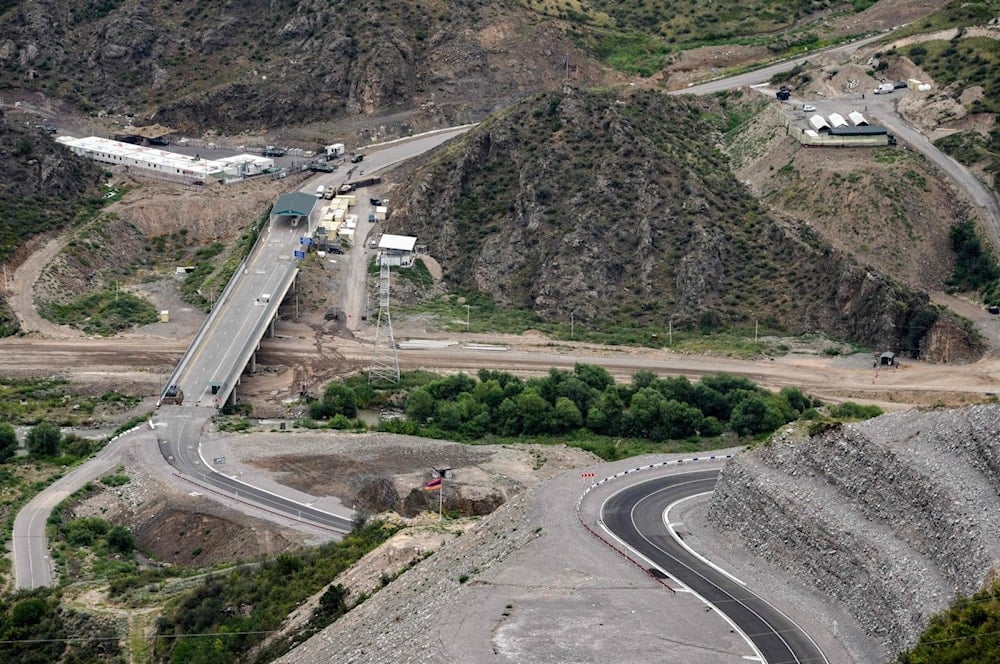US proposes leasing Zangezur corridor amid Armenia-Azerbaijan tensions
The US is in talks to lease the disputed Zangezur corridor between Armenia and Azerbaijan.
-

A view shows an Azerbaijani checkpoint at the entry of the Lachin corridor, in Karabakh, Azerbaijan, on July 30, 2023. (AFP)
The United States is reportedly prepared to lease the Zangezur corridor, a strategically contested route between Armenia and Azerbaijan, Izvestia reported on Saturday. Though initial news reports were semi-official, Armenian Prime Minister Nikol Pashinyan confirmed that negotiations with the US are underway.
The Zangezur corridor would connect Azerbaijan to its Nakhchivan exclave and Turkey, bypassing the need for Iranian transit routes. But Baku demands the road be extraterritorial, exempt from customs and border checks, an arrangement that Yerevan has long rejected as a violation of Armenian sovereignty.
According to the report, the US proposal seeks to neutralize these tensions, while the plan involves an American company managing the corridor under a long-term lease. That said, the US Ambassador to Turkey, Tom Barrack, stated that Washington is prepared to lease the 32-kilometer stretch of road for 100 years, aiming to end the deadlock between Baku and Yerevan.
Deputy Foreign Minister Mnatsakan Safaryan earlier confirmed the ongoing negotiations, emphasizing that Armenia would accept international management only if it respects the country’s sovereignty, jurisdiction, and territorial integrity.
Prime Minister Pashinyan echoed this stance, stating that while there is no final agreement yet, Armenia is open to the proposal. He dismissed sovereignty concerns by pointing to other existing examples, such as the extraterritorial management of Zvartnots Airport and parts of the country’s water infrastructure.
Corridor seen as a strategic route linking Turkey and Central Asia
According to Izvestia, the Zangezur corridor has long been a strategic objective for both Azerbaijan and Turkey. If established, it would provide a direct land route connecting Turkey to Central Asia via Azerbaijan, solidifying Ankara and Baku’s dominance in the South Caucasus.
Turkish Transport Minister Abdulkadir Uraloglu recently stated that infrastructure work in Turkey, Azerbaijan, and Nakhchivan is expected to be completed by 2028. According to the report, both Baku and Ankara have warned that Armenian resistance to the corridor could escalate into conflict, with Azerbaijani President Ilham Aliyev openly stating that "the power factor" will take precedence if necessary.
While neither Baku nor Ankara has officially responded to the US proposal, analysts believe both capitals are wary of any foreign oversight. Their ideal outcome appears to be full control over the corridor without international supervision. However, the report states that they may accept the US plan as a way to dilute Armenian control without fully surrendering strategic advantages.
Armenia, under increasing pressure, has subtly shifted its position. Pashinyan’s earlier "Crossroads of the World" initiative called for balanced regional transport access under national control, with international mediation on the table, the approach appears more flexible.
Experts warn of regional power shifts, Iranian opposition
As noted in the report, Sergey Melkonyan of the Armenian Institute for Applied Policy Research highlighted that both Turkey and the US share an interest in establishing the corridor; Ankara to expand its regional influence, and Washington to undermine Iran and Russia’s roles in the South Caucasus.
However, he questions how a private American entity could realistically manage customs, border security, and legal oversight. "Armenia remains in a difficult geopolitical position, with threats of border escalation and semi-blockade conditions," Melkonyan notes.
Moreover, Russian analyst Artur Ataev highlights the broader regional implications. He explained, Izvestia notes, that Iran has long opposed the corridor’s creation, viewing it as a strategic threat to its northern border. But he suggests that Tehran's regional influence might have weakened after the 12-day Israeli war.
Ataev also notes that Pashinyan’s evolving positions, from abandoning claims over Karabakh to now entertaining extraterritorial road management, reflect how internal and external pressures continue to reshape Armenia’s regional policies.

 4 Min Read
4 Min Read








